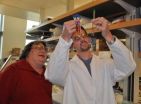(Press-News.org) How do individuals often cope with reentry from prison to society?
Too frequently with avoidance, says Lindsay Phillips, assistant professor of psychology at Albright College in Reading, Pa. and author of the forthcoming paper, "Prison to Society: A Mixed Methods Analysis of Coping with Reentry," to be published by the International Journal of Offender Therapy and Comparative Criminology.
"There is a defined process experienced by participants, which is initial optimism about release, followed by craving substances, facing practical barriers, or feeling overwhelmed," she says. "This eventually results in avoidance of managing problems and emotions and substance abuse relapse, which culminates in recidivism."
Phillips studied 20 individuals who returned to an urban prison to examine their most recent reentry process to identify barriers they faced and coping strategies they used.
"Although some tried to cope in a healthy manner initially, all eventually resulted in avoidance of managing problems and emotions," she says. "All relapsed into substance abuse. At this point, problems increased and all participants recidivated."
Participants identified a total of 57 instances in which coping mechanisms were used to manage barriers they faced during reentry. Of these instances, avoidance was used 37 times and problem focused (i.e. directly addressing a problem) was used eight times. "Participants reported 11 additional cases in which avoidance was used with another strategy or when other coping strategies were not effective," she says. "Therefore, in 48 of the 57 instances of coping by the 20 participants, avoidance coping strategies were used."
What participants thought they should do and what they actually did often conflicted, Phillips found. "Participants endorsed emotion-focused strategies, but these were infrequently used when they recalled their experiences," she says. "It's possible that they were unable to apply techniques to reduce their emotional reactions to the barriers they faced. Or they might have known healthy coping skills, but did not use them in practice."
"Clinical work with the population should in part focus on identification of healthy coping mechanisms to help individuals manage emotions and deal effectively with problems they will face during reentry and throughout life," she says. "Recidivism can be reduced through the teaching of coping strategies to prevent a return to crime."
### END
Study: Avoidance, poor coping challenge prisoners returning to society
2010-11-30
ELSE PRESS RELEASES FROM THIS DATE:
How authentic is your pomegranate juice?
2010-11-30
RIVERSIDE, Calif. – You pick up a bottle of pomegranate juice at the store because you've learned that, although it costs more than most juices, it is replete with antioxidants that bring health benefits. But wait: Is the juice you've purchased really pomegranate juice? Or is the product label you have carefully read promising more than it delivers?
A chemist at the University of California, Riverside is determined to find out. Cynthia Larive, a professor of chemistry, is playing detective by applying chemical tests to juice products sold as pomegranate juice or pomegranate ...
Evolutionary psychology: Why daughters don't call their dads
2010-11-30
CORAL GABLES, FL (December 7, 2010)— Previous research has shown that when women are in their most fertile phase they become more attracted to certain qualities such as manly faces, masculine voices and competitive abilities. A new study by University of Miami (UM) Psychologist Debra Lieberman and her collaborators offers new insight into female sexuality by showing that women also avoid certain traits when they are fertile.
The new study shows that women avoid their fathers during periods of peak fertility. The findings are included in a study entitled "Kin Affiliation ...
U of I scientists develop tool to trace metabolism of cancer-fighting tomato compounds
2010-11-30
URBANA – The University of Illinois scientists who linked eating tomatoes with a reduced risk of prostate cancer have developed a tool that will help them trace the metabolism of tomato carotenoids in the human body. And they've secured funding from the National Institutes of Health to do it.
"Scientists believe that carotenoids—the pigments that give the red, yellow, and orange colors to some fruits and vegetables—provide the cancer-preventive benefits in tomatoes, but we don't know exactly how it happens," said John W. Erdman, a U of I professor of human nutrition.
The ...
Moderate alcohol consumption lowers the risk of metabolic diseases
2010-11-30
With the emergence of an epidemic of obesity and type 2 diabetes (DM) throughout the world, the association of lifestyle habits that may affect the risk of metabolic diseases is especially important. Most prospective studies have shown that moderate drinkers tend to have about 30% lower risk of developing late onset diabetes than do non-drinkers, and moderate drinkers also tend to be at lower risk of developing metabolic syndrome (MS). A cross-sectional analysis of 6172 subjects age 35 -75 in Switzerland related varying levels of alcohol intake to the presence of DM, ...
Contact with dads drops when women ovulate
2010-11-30
Through an innovative use of cell phone records, researchers at UCLA, the University of Miami and Cal State, Fullerton, have found that women appear to avoid contact with their fathers during ovulation.
"Women call their dads less frequently on these high-fertility days and they hang up with them sooner if their dads initiate a call," said Martie Haselton, a UCLA associate professor of communication in whose lab the research was conducted.
Because they did not have access to the content of the calls, the researchers are not able to say for sure why ovulating women ...
Duke scientists look deeper for coal ash hazards
2010-11-30
DURHAM, N.C. – As the U.S. Environmental Protection Agency weighs whether to define coal ash as hazardous waste, a Duke University study identifies new monitoring protocols and insights that can help investigators more accurately measure and predict the ecological impacts of coal ash contaminants.
"The take-away lesson is we need to change how and where we look for coal ash contaminants," says Avner Vengosh, professor of geochemistry and water quality at Duke's Nicholas School of the Environment. "Risks to water quality and aquatic life don't end with surface water contamination, ...
Marsupial embryo jumps ahead in development
2010-11-30
DURHAM, N.C. – Long a staple of nature documentaries, the somewhat bizarre development of a grub-like pink marsupial embryo outside the mother's womb is curious in another way.
Duke University researchers have found that the developmental program executed by the marsupial embryo runs in a different order than the program executed by virtually every other vertebrate animal.
"The limbs are at a different place in the entire timeline," said Anna Keyte, a postdoctoral biology researcher at Duke who did this work as part of her doctoral dissertation. "They begin development ...
Apes unwilling to gamble when odds are uncertain
2010-11-30
DURHAM, N.C. -- Humans are known to play it safe in a situation when they aren't sure of the odds, or don't have confidence in their judgments. We don't like to choose the unknown.
And new evidence from a Duke University study is showing that chimpanzees and bonobos, our closest living primate relatives, treat the problem the same way we do.
In studies conducted at the Tchimpounga Chimpanzee Sanctuary in Republic of Congo and Lola ya Bonobo Sanctuary in Democratic Republic of Congo, researchers found the apes prefer to play it safe when the odds are uncertain.
Graduate ...
New tool to measure quality of patient care
2010-11-30
A national conversation continues about the best ways to improve both the quality of medical care and to contain costs. So far, developing quality measurements has focused on primary care or highly prevalent, chronic conditions such as asthma and diabetes. But what about brain disorders? To date, the number of measures that apply to neurologic care has been limited.
The American Academy of Neurology (AAN), an association of more than 22,500 neurologists and neuroscience professionals, reached out to a group of neurologists to develop such a set of measurements. Led ...
Chemistry for greenhouse gases
2010-11-30
If fossil fuels burn completely, the end products are carbon dioxide and water. Today the carbon dioxide is a waste product, one that goes into the air — adding to global warming; or the oceans — acidifying them; or underground — with as yet unknown consequences.
But it's not impossible, says Liviu M. Mirica, PhD, assistant professor of chemistry at Washington University in St. Louis, to drive things the other way, turning carbon dioxide into fuels such as methanol or hydrocarbons.
Until now reversing combustion has been a loser's game, because making carbon dioxide ...

